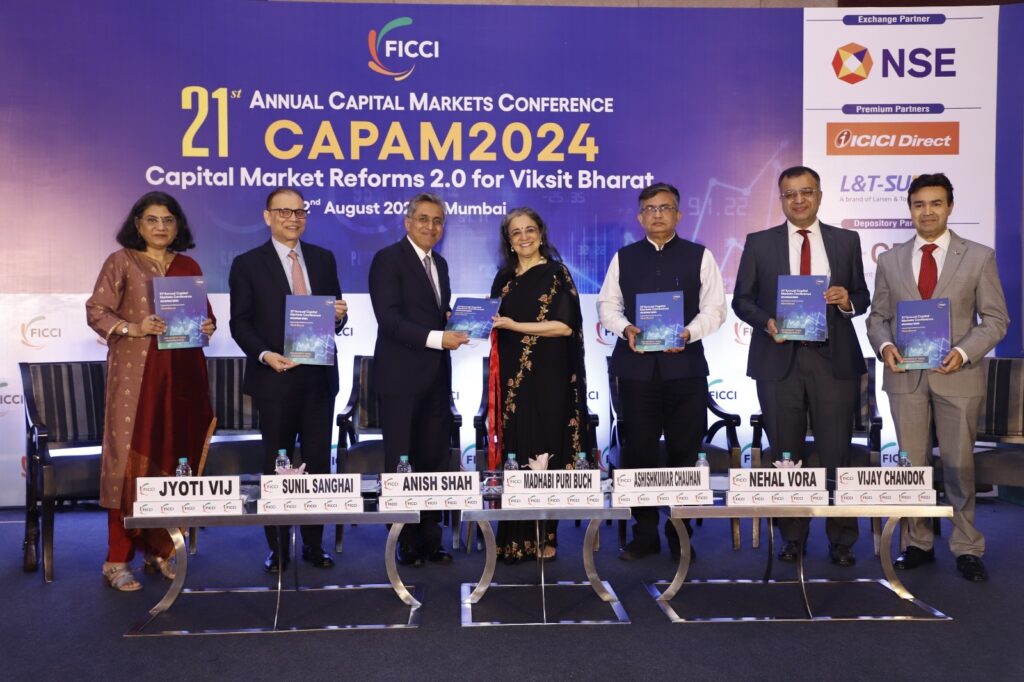SEBI to Unveil ‘Demystified’ IPO Process in Tech-Driven Market Overhaul

by Prashant Kapadia/NHN
We have already implemented artificial intelligence for processing public documents: Madhabi Puri Buch, SEBI Chairperson at FICCI’s 21st Annual Capital Markets Conference, CAPAM2024
SEBI working on a performance validation agency, streamlining KPIs for company listings and accelerating intermediary registrations.
MUMBAI August 2024: SEBI is rolling out a series of tech-driven initiatives to simplify processes and foster innovation. Addressing FICCI’s 21st Annual Capital Markets Conference, CAPAM 2024, the SEBI Chairperson, Ms Madhabi Puri Buch, outlined several key reforms designed to enhance the efficiency and accessibility of the country’s financial markets.
Central to these reforms is the introduction of a “demystified IPO document,” a template-based approach aimed at simplifying the listing process. “We are creating a template fill-in-the-blank IPO document,” the Chairperson, Ms Buch explained. “With this, we believe that the document will be precise; it will be meaningful because it says here are the 50 things which are necessary for an investor to make a decision.”
SEBI is leveraging cutting-edge technology to revolutionise this process further. “We are now developing technology using artificial intelligence,” the SEBI Chairperson revealed. “We are implementing artificial intelligence for processing public documents, and AI does 80% of the work.” This AI-driven approach is being extended to IPO documents as well. “We are working, as we speak, on AI-based processing of IPO documents,” Ms Buch stated.
Alluding to the concerns surrounding initial public offerings (IPOs), Chairperson SEBI acknowledged that this has been “an area of concern” for recently listed companies. A key issue has been the disclosure of Key Performance Indicators (KPIs) in offer documents. To address these concerns, SEBI has referred the matter to the Industry Standards Forum (ISF). “We have now shared our concerns, and the industry has shared their concerns,” the Chairperson explained, expressing confidence in finding a “win-win situation.”
Ms Buch lauded the success of the ISF, which has played a crucial role in developing industry standards across various sectors. “The industry standards forum across the spectrum has been such a learning experience for us,” the Chairperson noted, adding that SEBI is now formalising the ISF as part of its regulatory architecture.
In a move to accelerate market entry for new players, SEBI is working to speed up the registration process for intermediaries. Ms Madhabi Buch revealed, “Just in the last one month, we have got 118 applications for new registration, reflecting the vibrancy of the sector.”
A notable innovation in the pipeline is the introduction of a performance validation agency, a new institution designed to enhance transparency and credibility in the market. “NSE has done some brilliant work,” the Chairperson Buch enthused. This new institution will allow any market participant to have their performance claims validated, whether they are algorithm providers, investment advisors, or research analysts. This initiative leverages advanced technology to provide a scalable solution for performance validation.
Underlying all these initiatives is a strong emphasis on technology adoption. SEBI is rapidly embracing supervisory technology (SupTech) and urges market participants to adopt regulatory technology (RegTech). “We are rapidly adopting SupTech… a lot of supervision we now do, and it’s not just market surveillance, it’s inspection, and all of that is now using technology,” the Chairperson SEBI explained.
On the occasion, FICCI President Dr Anish Shah highlighted the need for private sector involvement to complement government capital expenditure. “Over the last three to four years, government capex is driving the development agenda. Private capex is lagging and it’s for the private sector to step up and contribute to that growth,” Shah stated. He emphasised the importance of balancing ease of doing business with robust regulatory guardrails. Shah praised the SEBI’s openness to industry dialogue, citing recent collaborative efforts on market rumour verification policies.
Mr Ashishkumar Chauhan, MD & CEO, National Stock Exchange (NSE), noted the surge in retail investor participation, with direct investors now numbering ten crore, representing 20% of Indian households. He attributed this growth to improved corporate governance and investor trust. The NSE chief also praised India’s market infrastructure, stating, “The transaction processing framework of India is now the best in the world.”
In addition, Mr Sunil Sanghai, Chairman, FICCI National Committee on Capital Markets and Founder & CEO, NovaaOne Capital highlighted the need for balanced regulation that encourages innovation while maintaining market discipline. “We do need discipline. At the same time, we also need a little bit of development legroom,” Mr Sanghai stated.
He proposed a significant reform to expedite corporate restructuring processes, suggesting that the Securities and Exchange Board of India (SEBI) could assume some responsibilities currently held by the National Company Law Tribunal (NCLT). “Can SEBI take on the responsibility of NCLT? The point is that in the banking sector, those powers of NCLT are given to RBI, which as a regulator, acts as a court,” Mr Sanghai explained. He argued that this change could significantly reduce the time taken for mergers and acquisitions, addressing the issue of time value in deal-making.
Mr Nehal Vora, Managing Director and CEO of Central Depository Services India Limited (CDSL),emphasised the crucial role of technology and investor education in driving India’s capital market growth. He alluded to the concept of ‘TIR’—technology, Investor Education, and Right Conduct—as key pillars for market development. Mr Vora also praised the Securities and Exchange Board of India (SEBI) for its reform initiatives, particularly the move towards T+0 settlement. “It’s the Chandrayaan moment of securities market where nobody dared to go in the world,” he remarked, emphasising India’s pioneering role in global financial markets.
Mr Vijay Chandok, Co-Chair, FICCI Capital Markets Committee and MD & CEO, ICICI Securities, delivered the vote of thanks, noting that digitalisation and digital infrastructure have really transformed financial inclusion.
Ms Jyoti Vij, Director General, FICCI, thanked the SEBI Chairperson for agreeing to work with FICCI on the next wave of transformative changes in capital markets, which align with Viksit Bharat’s vision.